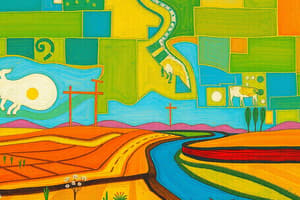Podcast
Questions and Answers
What does the term "Mesopotamia" mean?
What does the term "Mesopotamia" mean?
- Land of the Gods
- Land of the Nile
- Land of the Pharaohs
- Land between two rivers (correct)
Mesopotamian farmers relied solely on rainfall for their crops.
Mesopotamian farmers relied solely on rainfall for their crops.
False (B)
What were the three key benefits of the Tigris and Euphrates Rivers for Mesopotamian civilization?
What were the three key benefits of the Tigris and Euphrates Rivers for Mesopotamian civilization?
Water for irrigation, transportation routes, and water for basic needs.
Mesopotamian farmers used ______ to transport water to their crops.
Mesopotamian farmers used ______ to transport water to their crops.
Match the following Mesopotamian river benefits with their corresponding uses:
Match the following Mesopotamian river benefits with their corresponding uses:
What was a major challenge for Mesopotamian farmers?
What was a major challenge for Mesopotamian farmers?
The Tigris and Euphrates Rivers were crucial for the development of Mesopotamian civilization.
The Tigris and Euphrates Rivers were crucial for the development of Mesopotamian civilization.
Flashcards
Mesopotamia
Mesopotamia
Region between the Tigris and Euphrates Rivers, known as the 'land between two rivers.'
Tigris and Euphrates Rivers
Tigris and Euphrates Rivers
Two major rivers that create fertile land in Mesopotamia.
Irrigation
Irrigation
A method to supply water to crops, crucial for farming in Mesopotamia.
Canals
Canals
Signup and view all the flashcards
Transportation on Rivers
Transportation on Rivers
Signup and view all the flashcards
Floodplain
Floodplain
Signup and view all the flashcards
Droughts
Droughts
Signup and view all the flashcards
Study Notes
Mesopotamia
- Villages developed outside of Africa and into Europe and the Middle East
- Mesopotamia is land between two rivers (Tigris and Euphrates) in modern-day Iraq and Iran
- The word "Mesopotamia" means "land between two rivers"
- Rich soil allowed plant growth
- Rivers overflowed due to glacier melt, flooding the floodplain
- Floodplain is the land bordering the rivers
- River water seeped into the flat land for farming
Rivers
- People settled near rivers for water for irrigation, transportation, and basic needs
- The rivers provided water for irrigation, transportation routes, and drinking/bathing
Transportation
- Using boats on the river was easier than walking
- Easier movement of goods
- Water was used to help farmers
Irrigation
- Predicting rain was a farmer's biggest challenge
- Rivers were key for irrigation in human history
- Irrigation gave people control over their environment
- Farmers no longer needed to wait for rain using irrigation
- Drought (a long period without rain) was a problem for farmers
- Lack of technology (sprinklers) meant canals were dug instead
- Water levels in canals needed to rise to reach plants
- During droughts, water levels stayed low, causing irrigation failure, plant death, and famine
Studying That Suits You
Use AI to generate personalized quizzes and flashcards to suit your learning preferences.




